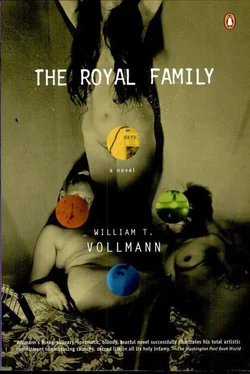William Vollmann - The Royal Family
Здесь есть возможность читать онлайн «William Vollmann - The Royal Family» весь текст электронной книги совершенно бесплатно (целиком полную версию без сокращений). В некоторых случаях можно слушать аудио, скачать через торрент в формате fb2 и присутствует краткое содержание. Год выпуска: 2000, ISBN: 2000, Издательство: Penguin, Жанр: Современная проза, на английском языке. Описание произведения, (предисловие) а так же отзывы посетителей доступны на портале библиотеки ЛибКат.
- Название:The Royal Family
- Автор:
- Издательство:Penguin
- Жанр:
- Год:2000
- ISBN:9780141002002
- Рейтинг книги:5 / 5. Голосов: 1
-
Избранное:Добавить в избранное
- Отзывы:
-
Ваша оценка:
- 100
- 1
- 2
- 3
- 4
- 5
The Royal Family: краткое содержание, описание и аннотация
Предлагаем к чтению аннотацию, описание, краткое содержание или предисловие (зависит от того, что написал сам автор книги «The Royal Family»). Если вы не нашли необходимую информацию о книге — напишите в комментариях, мы постараемся отыскать её.
The Royal Family — читать онлайн бесплатно полную книгу (весь текст) целиком
Ниже представлен текст книги, разбитый по страницам. Система сохранения места последней прочитанной страницы, позволяет с удобством читать онлайн бесплатно книгу «The Royal Family», без необходимости каждый раз заново искать на чём Вы остановились. Поставьте закладку, и сможете в любой момент перейти на страницу, на которой закончили чтение.
Интервал:
Закладка:
He hopped a string of grainer cars which, slow and solemn, like Irene brushing back her hair, bore him away.
| 583 |
For my soul is full of troubles, runs the Book of Psalms, and my life draws near to Sheol. * Domino could say that — oh, she certainly could, for it was quite a job keeping other street-whores under her thumb — and so could John in his office, and so could the bail bondsman who’d misplaced some cash, to say nothing of the reporter for the alternative newspaper in Sacramento who could not get any more advances on his paycheck; and the same complaint might plausibly have been uttered in the slow exhausted gravel-speech of the Wheelchair Men, or in faster parlance by members of the newspaper-fascinated coffee-house crew on Valencia Street: the rain-wetted, cigar-smoking old poet, the thoughtful leather-vested women who licked chocolate-covered spoons to the dreamiest possible music while they gazed across the street at the word HEALTH which formed part of an arch upon a miraculously shining window; hemmed in by the hissing of rain and the sucking sounds of raincoat-sleeves, they polished their troubles to a sheen as of wet window-glass — boyfriend troubles and girlfriend troubles, troubles of money, troubles of pain; how could you say that the woes of the elite were not just as cruel as Domino’s? What hurts hurts. — Make me look happy, rentable Strawberry said to the artist. I’m always sad, so draw a smile on my face. Please? — And John progressed likewise toward Sheol, angry and sad even though his stocks had split twice; and Irene, leaving behind a diamond wedding ring, killed herself to become mistress of the dirt. All the kings of the nations lie in glory, each in his own tomb, but you are cast out, away from your sepulchre like a loathed untimely birth. †It is the occupation of politicians to deny this ubiquity, nay, universality of corroded hearts, to discount the barren laboriousness of all paths. Reduce corporate taxes, they say, or redistribute the wealth of the parasitic class to the desperate class, and then all who matter can cross the Jordan together and enter into a new land of happiness whose prior inhabitants will dissolve into sea-colored ghosts of dust. Pain may be divided, but no Euclid or Leibniz has yet proven that it can be subtracted. Thus Tyler’s do-nothing’s logic, which led him from Coffee Camp to the quiet of two tents on the riverbank, then onto the rails, to Roseville, Olivehurst, Portland, Barstow, Victorville (burning tracks, brown Santa Fe cars, blue and yellow cars), to Waldo’s desert and Slab City and the Drops; then finally beneath the white pillars of the Miami freeway to the opened hydrant from which homeless nestlings drank — both drink and drinkers eternally approachable like a whore or like God, unnatural spring which flowed down the sidewalk just as the grapevines of rejoicing creep across the vineyard. Water of drunkenness, water of tears, water of coffee-making and handwashing, water that carries away the taint of sweat and excrement down to Sheol, where someday all of us must lie, at one with our filth at last; water of death, poured kindly out to wash and purify the body of his dead Queen, scrubbing the lines and calluses of her hard-working hands before the wailers set her deep into the ground, beyond reach of vigilantes, johns, whores, cares and destruction — she was destroyed, had vanished from the land — water which joins us all, slain and slayers, entering us through our organs of speech, departing from us as poison; water is grateful to the troubled; water quenches the anguish of Irene or Domino: the jackal and the rose must both have water. My Queen is no more! he said to himself, wandering, remnant of himself, from San Francisco to Los Angeles to New Orleans, and then by stages of walking, freight-hopping and hitchhiking to Tampa and finally Miami where beneath the white freeway pillars the hydrant flowed.
On account of that now perpetual fountain’s likeness to a whore and to God, the city fathers, so called, kept resolving between intervals of other desolate business to shut it down, but the mayor of the white outcasts had replied without affected defiance to their sentries and messengers the squad car men that if they sealed off the hydrant, his constituency would have to take their water where they could find it — a fact of nature which the officers recognized and relayed back to the city fathers as such: Vagabonds, goldbricks, self-destroyers, sojourners, fugitives, crooks, whores, panhandlers, fruit loops and banana boats need to drink, too! Why not make it easy on all three sides — namely, on the leaders, on the led like John, Irene, Tyler himself, and the coffeehouse and Coffee Camp people, and on those who drank from fire hydrants? That was how the white mayor told the story, but whether the city fathers had ever (to use a tired civic metaphor) played ball or even been apprised of the hydrant’s continual flow, to say nothing of the homeless mayor’s very existence, the mayor had no basis for saying, although his foundationlessness in no wise impeded his orations, he being almost as greedy of reputed omniscience as he was of cash, which was why he charged every toll he could whenever a new constituent wandered under the freeway pillars to his Caucasian island, whose boards of different colors and sizes had been nailed up under (predominantly) mayoral control to make walls of rough cubes enflanking a line of laundry, an American flag hanging out to dry; and above that island the stretched-elastic sounds of wind and blind traffic comprised the chorus to the mayor’s endless act. The freeway was so high above him that the palm trees which God had permitted in the long thin rectangles of light were as blades of grass; from far away there was only the freeway, beneath which lurked a handful of tiny square silhouettes: the mayor’s box-houses. The mayor kept a little pistol up his ass, so everybody said; at least he kept it somewhere inside his bluejeans, ready to reify his authority as needed. Let’s say that a new couple, good and white, showed up beneath the freeway, admitting that they might stay for more than a night or two: the mayor was willing to rent them a plywood shanty for fifty dollars a month, television hookup included because he knew how to drain images most reliably and illegally from among the cables which buzzed overhead among the roaring cars. The mayor did not pull out his pistol then. He explained that if you were accepted into the community you’d be protected. The main rule was the American rule: to respect the property of others. The mayor gave you two chances. The first time you were caught stealing, out came the pistol as needed; then everybody beat you up, you made restitution, and it blew over. The second time, they pulled down your house and you were never allowed back. But obey the social contract, act a white islander’s part, and you had friends. The niggers on their far too adjacent island were too much like animals to be represented by any mayor, the mayor said. Over there it was the law of the jungle for jungle bunnies. Now, some niggers were all right, and then they were worthy of being called black people. If a black man or a black woman was proved by repeated fair dealing to be such, why, that person was welcome to live on the white island because we weren’t racists. That mattress on the island’s edge, for instance, was Stanley’s. Stanley was the mayor’s best friend. Anita was another worthy black lady who lived with her white man in a palatial packing crate for which they paid the mayor the unofficial rate of thirty dollars a month. Down by the portable toilet, whose shit and used toilet paper now reached to shoulder height, lived Ellen. Ellen was a slut (explained the mayor to visiting Chamber of Commerce dignitaries), a black nigger slut, but she gave good head, so he let her stay. Sometimes she shorted on her rent when her customers went on vacation or whatever it was that they did, but the white mayor was willing to work with her; he had heart, you see. And Ellen obeyed the other rules. In her two years on the island, she had never stolen from anybody. What was more, she lived both tranquilly and literally in the shadow of the toilet. Not every white woman would have been satisfied to breathe that stench! Her religiousness was of the quiet kind. The mayor didn’t go for religion much himself. Sometimes the Catholic relief volunteers showed up with food and clothes for those who prayed, so he’d pray along, but with his fingers crossed, so to speak; he was thinking of giving up that luxurious hypocrisy since rents, haircuts and protection were actually bringing in so much money that he was getting rich. He didn’t need the christlike bastards! Now, if somebody wanted to swallow their crap, he had nothing against it. It was a free country, an American country. If Ellen could bear to live there breathing in the smell of rotten turds all day and all night, why, she could scarf up Jesus, too, for all he cared. Near the river was the island where the Spics lived — Nicaraguans, Cubans, Haitians, Mexicans, the whole lot — and most of them were religious. Ellen sometimes went over to sing hymns with them. That was no skin off the mayor’s nose.
Читать дальшеИнтервал:
Закладка:
Похожие книги на «The Royal Family»
Представляем Вашему вниманию похожие книги на «The Royal Family» списком для выбора. Мы отобрали схожую по названию и смыслу литературу в надежде предоставить читателям больше вариантов отыскать новые, интересные, ещё непрочитанные произведения.
Обсуждение, отзывы о книге «The Royal Family» и просто собственные мнения читателей. Оставьте ваши комментарии, напишите, что Вы думаете о произведении, его смысле или главных героях. Укажите что конкретно понравилось, а что нет, и почему Вы так считаете.












